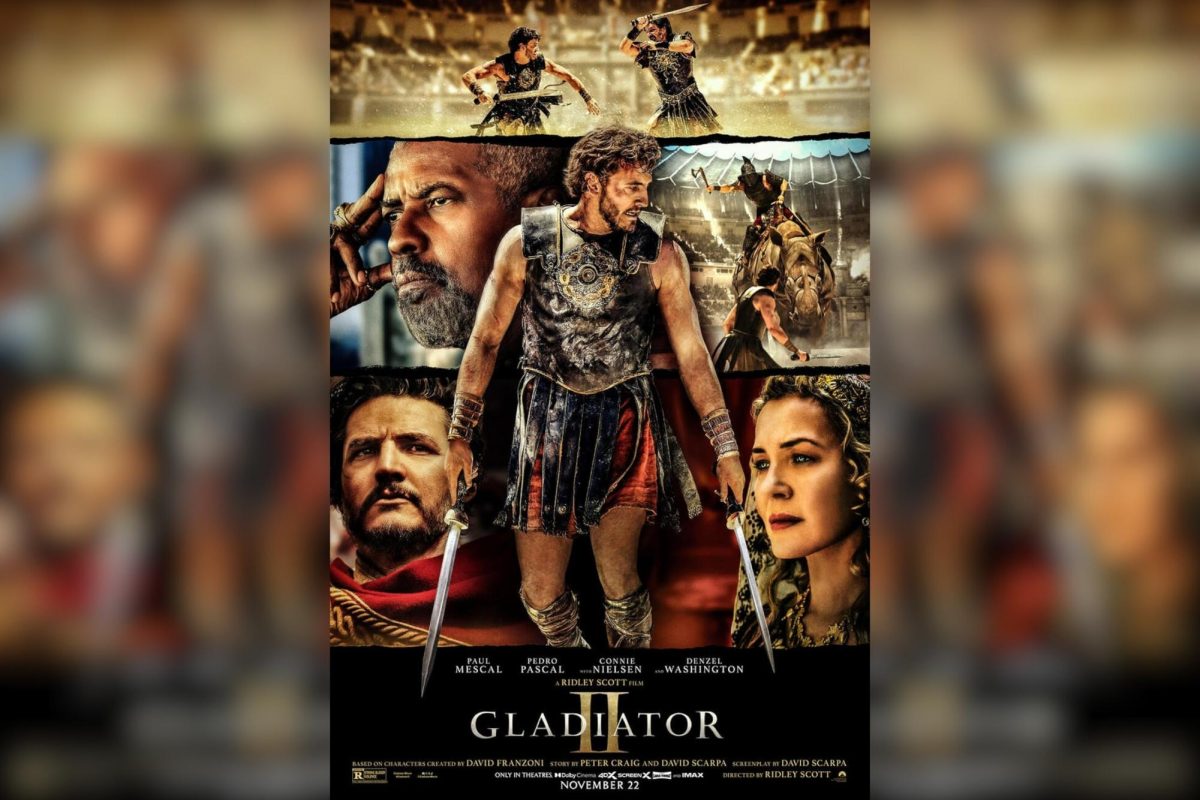Twenty-four years ago, audiences held bated breath as a tortured Russell Crowe roared “Are you not entertained?” to a thunderous crowd of Romans as slain gladiators lay bleeding around his feet. Nearly a quarter-century later, the quote from “Gladiator” still reverberates around our popular culture — its sequel, “Gladiator II” will not leave the same lasting mark even 24 months from now, but audiences will surely be entertained.
In 2000, “Gladiator” swept awards and the hearts of audiences. The period epic, set circa 180 A.D., follows Crowe as Maximus — a scorned ex-general and champion Gladiator — and Joaquin Phoenix as Commodus, the tyrannical and unhinged emperor of Rome.
Even before Ridley Scott went flop after flop after flop in the early 2020s — “The Last Duel,” “House of Gucci” and “Napoleon,” respectively — upon the announcement of “Gladiator II,” audiences were already wary of a sequel. Maximus is already dead — what’s left for us in Rome?
“Gladiator II” picks up 16 years following the death of Maximus and Commodus. Paul Mescal plays Lucius Verus, who we saw as the 12-year-old nephew of Commodus in the first film. After being sent away by his mother, Lucilla, played by Connie Nielsen in both films, he returns to his hometown as a prisoner of war. General Acacius — played by Pedro Pascal — has conquered Lucius’s previous home and killed his wife in one fell swoop, bringing him to the feet of Macrinus, portrayed by Denzel Washington. Macrinus, a wealthy arms dealer and businessman, is still jockeying for the seat of Emperor of Rome. After successfully fighting an otherworldly-looking baboon in a scene so graphic an audible “My lord” left the woman sitting next to me, Lucius is selected to become a prized gladiator to fight in the games in the Colosseum.
The cinematography of the fight scenes is truly remarkable. The Colosseum battles are breathtaking and captivating, immersing the viewer so deeply that it feels as if the blood spilled might spray through the screen. However, the film offers a finite glimpse of the broader Rome, instead choosing to confine its setting to opulent homes and dungeon cells. While Scott’s dynamic camera work effectively highlights the class disparities within the city, it limits the film’s overall scope.
As soon as Washington sweeps onto the screen, draped in elaborate, colorful, gold-trimmed robes and heavy rings upon each finger, his larger-than-life character captivates the audience completely. His bravado and charm steal the show from the rest of the cast. After revealing that he has not auditioned for a role since the last century, Washington’s performance serves as undeniable proof of his enduring prestige. As Macrinus, the film’s most compelling character, he fully capitalizes on the complex and richly layered material he is given.
Pascal was underutilized in this film. As he bellows, “For the glory of Rome,” Acacias is seemingly set up to be a third lead behind Lucius and Macrinus. However, he disappears into the background behind Nielsen’s Lucilla. This is a shame, as he shows much more flair in his limited screen time than Nielson manages in her abundance.
The twin emperors who have taken over Rome, Geta and Caracalla, played by Joseph Quinn and Fred Hechinger respectively, did not want to duplicate the performance of their emperor counterpart from the first film, yet the comparisons are inevitable. Unfortunately and unsurprisingly, they do not live up to Phoenix, due to no fault of their own.
Mescal, in his first blockbuster after a string of strong performances in lower-budget dramas, has beefed up considerably for this role. Despite his larger frame, he still delivers the sensitive performances that have brought him critical acclaim. It’s hard to follow up a performance like Crowe’s, but his character is not meant to command the screen like Maximus. Regardless of reviews stating that Mescal is not a “movie star” and is not as good as Washington — I mean…duh? It’s Denzel Washington — the script does not ask for machismo, and he delivers on what he was given.
There have been constant comparisons to the film’s predecessor, as anyone would expect of a sequel. In fairness, Scott and his screenwriter David Scarpa repeated the same story beats and characters from the first, making it nearly impossible to experience the second without thinking of the former. The screenplay was a noticeable low point of the first, and the sequel fails to capitalize on the opportunity to improve this.
Worse still, in an attempt to appear original, it sacrifices much of the complexity surrounding our emperor and gladiator characters. The new emperors are simply queer-coded and evil, abandoning the depth Phoenix’s character had to offer. Lucius does not embody the rage and control that Maximus does. While the quiet, poetic anger Mescal exudes could serve as an interesting foil for Macriumus’ braggadocio, it ultimately falls flat.
Ridley Scott’s return to ancient Rome dazzles with visceral fight sequences and commanding performances, but it struggles under the weight of the previous iteration. Despite the shortcomings, it is undeniably a good time. When the fight sequences feel fast and fresh and Washington and Scott invite audiences on a wild, though predictable, ride, it’s nearly impossible not to want to join them. It will entertain for the moment, but unlike the original, it is unlikely to linger in the cultural consciousness for years to come.


